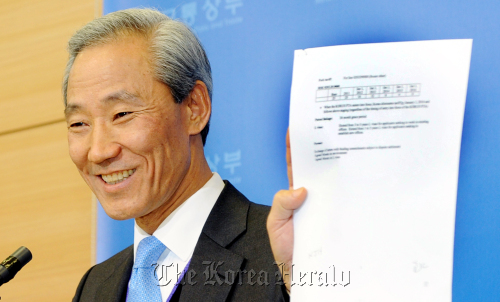The Korean government Sunday defended a revised free trade agreement with the U.S. in the face of rising domestic criticism that it made too much concession in automobile regulations.
During marathon talks in the U.S., Seoul accepted a range of Washington’s demand for its struggling auto industry, including delaying tariff eliminations and adding a safeguard to curb a surge in Korean imports.
In return, Korea made some gains in rules on pork, medicine and work visas. It also made no concession on beef imports.
“We cannot agree with the view that one-sided concessions were made,” Trade Minister Kim Jong-hoon said in a news conference.
“(The negotiations) Were carried out with the aim of minimizing changes to the agreement and a balance of benefits for a win-win effect for Korea and the U.S.”
He was responding to sharp criticism from opposition parties and activists after the U.S. government released the result of the negotiations between Kim and U.S. Trade Representative Ron Kirk on Friday.
Opposition parties threatened to reject the changes at the National Assembly accusing the government of succumbing to U.S. pressure.
Both governments hailed the agreement as a “win-win” balance of interests of the two countries.

Trade Minister Kim Jong-hoon shows the document containing the changes to a Korea-U.S. free trade agreement at a news conference in Seoul on Sunday. (Park Hyun-koo/The Korea Herald)
President Lee Myung-bak said the FTA should bring huge economic benefits for both countries and will help take the South Korea-U.S. alliance to the next level.
“The latest agreement is significant in that it equally reflects interests of both countries and has formed the basis for a ‘win-win’ situation,” Lee said in a statement Saturday.
“Everyone worked together to find alternatives that would be acceptable by both sides in order to ratify and put in effect the KORUS FTA.”
In Washington President Barack Obama said the FTA shows the alliance between them is “stronger than ever” and will offer “core choices for Korean consumers and more jobs for American workers.”
“The tariff reductions in this agreement alone are expected to boost annual exports of American goods by up to $11 billion,” Obama told reporters at the White House.
“It’s estimated that today’s deal alone will increase American economic output by more than our last nine free trade agreements combined,” he added.
Korean and U.S. industry groups also welcomed the compromise saying it will boost bilateral trade and help drive growth of both countries.
Korean automakers expressed strong support for the deal dismissing concerns about possible damage to their business.
“The agreement will greatly contribute to enhancing cooperative development and exchanges between the automobile industries of the two countries,” the Korea Automobile Manufacturers Association said in a statement.
Korea and the U.S. signed the FTA in 2007 but failed to get parliamentary approval.
The latest agreement was made during the ministerial talks last week. The talks were the third in its kind since Obama in June called for outstanding issues regarding the trade pact to be resolved by November.
The talks, originally scheduled to run for two days, stretched on until Friday and the two sides met on 20 separate occasions.
At the center of contention was the automotive industry.
The two sides agreed to include a safe guard clause allowing either side to reinstate tariffs on fully assembled vehicles if there is a “sudden and rapid” increase in automobile imports as a direct result of removing the tariffs.
Korea also agreed to halve the tariffs placed on U.S.-made vehicles immediately after ratification and remove them entirely after four years.
The U.S. will maintain its tariff on Korean-made vehicles at 2.5 percent for four years.
The same measures will be applied to electric vehicles.
Regarding tariffs on commercial vehicles, the two sides agreed that the U.S. will continue to place 25 percent tariffs on such vehicles for seven years after the deal is implemented. After seven years, the U.S. will remove tariffs on commercial vehicles over a period of two years.
Seoul will also exempt U.S. carmakers that sell less than 25,000 vehicles in Korea per year from meeting local safety standards provided that they comply with U.S. regulations.
In addition, Korea will lower its carbon dioxide emission standards by 19 percent for U.S. carmakers that sell less than 4,500 units on the local market.
Seoul’s demands accepted by the U.S. include delaying tariff removal on frozen pork neck and rib meats by two years, and easing of visa regulations regarding Korean nationals working for a local firm within the U.S.
Regarding beef issues, Trade Minister Kim said that beef is not included in any document and that the issue was not discussed.
By Choi He-suk (
cheesuk@heraldcorp.com)



![[KH Explains] No more 'Michael' at Kakao Games](http://res.heraldm.com/phpwas/restmb_idxmake.php?idx=645&simg=/content/image/2024/04/28/20240428050183_0.jpg&u=20240428180321)


